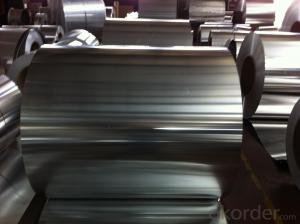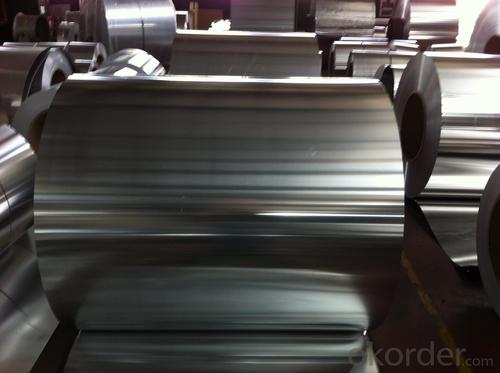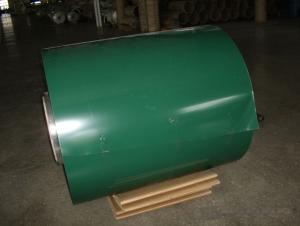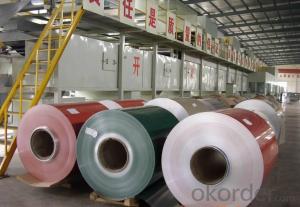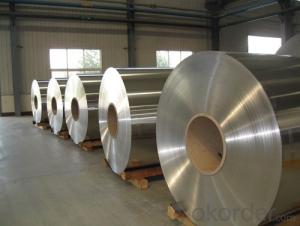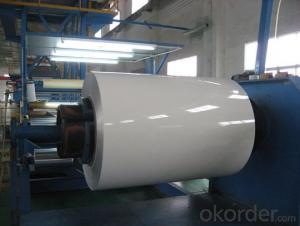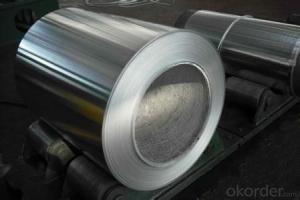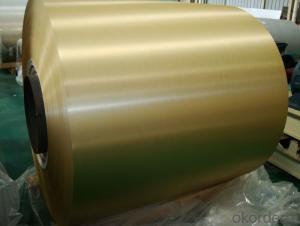Aluminum Coil Roll 1100 Alloy for Roofing/Ceiling/Gutter/Decoration
- Loading Port:
- Shanghai
- Payment Terms:
- TT OR LC
- Min Order Qty:
- 5 m.t.
- Supply Capability:
- 60000 m.t./month
OKorder Service Pledge
OKorder Financial Service
You Might Also Like
Specification
Alloy 1100 Aluminium Roll for Roofing/Ceiling/Gutter/Decoration
Specification
Grade
| 1000 Series: 1050 1060 1070 1100 1200 1235 etc. 3000 Series: 3003 3004 3005 3104 3105 3A21 etc. 5000 Series: 5005 5052 5083 5086 5154 5182 5251 5754 etc. 6000 Series: 6061 6063 6082 6A02 etc. 8000 Series: 8006 8011 8079 etc. |
Thickness | 0.05~10mm |
Width | <1600mm< span=""> |
Color | Metallic, Solid, RAL or by customer requirements |
Coating paint: | PVDF(Polyvinylidene Fluoride), PE(Polyester ) |
Coating thickness | as per customer’s request |
Gloss | 10-90%(EN ISO-2813:1994) |
Total coating thick | Polyester18~25micron(EN ISO-2360:1995) PVDF25 ~35micron(EN ISO-2360:1995) |
Coating hardness | 2H |
Protective film | PVC film, Colorless transparent or White-black |
Adhesion | 5B (EN ISO-2409:1994) |
Impact resistance | No cracking and peeling (A.S.T.M D2794-1993) |
Flexibility (T-bend) | 0T- 2T |
Temper | H16, H18, H24, H26, H26 |
Certification | ISO9001:2000, CE, SGS |
Coil's standard diameter | 1100mm |
Inner Diameter | 405mm/505mm |
Coil's standard weight | 2000kgs |
Payment | L/C ,T/T |
Packing
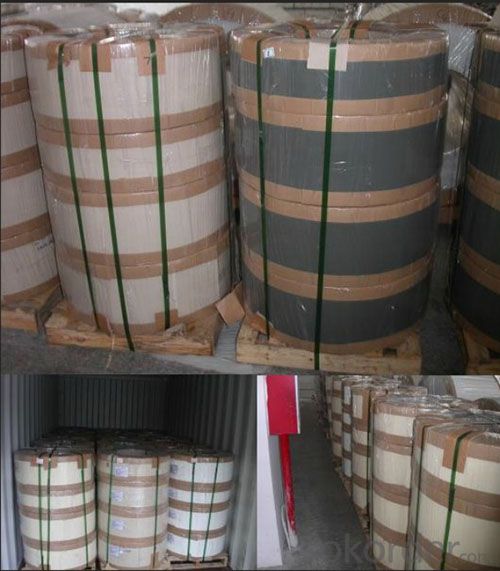
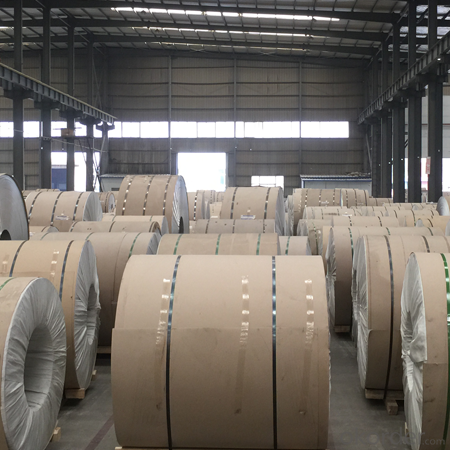
FAQ
Q: How can I request a product sample? A: The samples are free but freight should be collected. Please send sample list and courier account number by email.
Q: How can I request a product catalog? A: The hard copies of catalogs are free but freight should be collected. Please send courier account number by email. You are suggested to request a PDF catalog.
Q: Wha's your payment terms? A: One is T/T 30% before production and 70% against copy of B/L; the other is Irrevocable L/C 100% at sight.
Q: What's your trade terms? A: FOB, CNF(CFR), CIF, EXW.
Q: How long is the quality guarantee? A: All of our products have a period of quality guarantee since time of shipment. Please contact your salesman for more details, as different products enjoy different time of guarantee
- Q: How are aluminum coils joined together to form larger panels?
- Aluminum coils are joined together to form larger panels through a process known as coil joining or coil-to-panel joining. This process typically involves the use of a coil joining machine, which is designed to connect multiple coils of aluminum together seamlessly. The first step in this process is to feed the individual coils into the machine. The machine then unwinds the coils and brings them together, aligning them side by side. The edges of the coils are typically overlapped slightly to ensure a secure and continuous connection. Once the coils are aligned, the machine uses various techniques to bond them together. One common method is through the use of heat and pressure. The machine applies heat to the overlapping edges of the coils, softening the aluminum and allowing it to fuse together. Simultaneously, pressure is applied to ensure a strong bond is formed. Another method of joining aluminum coils is through the use of mechanical fasteners. In this case, the machine will punch holes through the overlapping edges of the coils and insert fasteners, such as screws or rivets, to hold them together securely. After the coils are joined, the machine continues to feed the connected coils forward, allowing for continuous production of larger panels. The excess material from the overlapping edges is typically trimmed off, resulting in a smooth and seamless panel. Overall, the process of joining aluminum coils to form larger panels requires precision and specialized machinery. The resulting panels are durable, lightweight, and commonly used in various industries such as construction, automotive, and aerospace.
- Q: How do aluminum coils contribute to energy-efficient windows and doors?
- Aluminum coils play a significant role in making windows and doors energy-efficient. Firstly, aluminum is a highly conductive material, meaning it can efficiently transfer heat and cold. This property allows aluminum coils to act as a thermal barrier, preventing the transfer of heat from the outside to the inside and vice versa. By minimizing heat transfer, aluminum coils help to reduce the amount of energy needed to cool or heat a building, resulting in lower energy consumption and reduced utility bills. Additionally, aluminum coils are often used in the construction of window and door frames due to their lightweight and durable nature. This lightweight property makes it easier to install and operate windows and doors, while their durability ensures long-lasting performance. The use of aluminum coils also allows for the creation of sleek and narrow frame designs, maximizing the glass area and allowing more natural light to enter the building. This reduces the need for artificial lighting during the day, further contributing to energy savings. Moreover, aluminum is a highly recyclable material, and the use of aluminum coils promotes sustainability. By using recycled aluminum to manufacture these coils, energy-efficient windows and doors can be created with a lower carbon footprint. This reduces the environmental impact of the building industry and contributes to a more sustainable future. In conclusion, aluminum coils contribute to energy-efficient windows and doors through their thermal barrier properties, lightweight and durable nature, and recyclability. By minimizing heat transfer, facilitating efficient installation, and reducing the use of artificial lighting, aluminum coils play a key role in creating sustainable and energy-saving building solutions.
- Q: How do aluminum coils contribute to energy-efficient appliances?
- Aluminum coils play a key role in enhancing the energy efficiency of appliances. The use of aluminum in coil form allows for efficient heat transfer, which is essential for appliances that require cooling or heating mechanisms. Firstly, aluminum coils have excellent thermal conductivity. This means that they can quickly absorb and dissipate heat, resulting in more efficient cooling or heating processes. This is especially important in appliances such as refrigerators, air conditioners, and heat pumps, where effective heat transfer is crucial for maintaining the desired temperature. Moreover, aluminum coils are lightweight yet durable, making them an ideal choice for energy-efficient appliances. The lightweight nature of aluminum reduces the overall weight of the appliance, which leads to lower energy consumption during transportation and installation. Additionally, the durability of aluminum ensures a longer lifespan for the appliance, reducing the need for frequent maintenance or replacement. Furthermore, aluminum is highly resistant to corrosion, which is a common issue in appliances that involve contact with water or moisture. By using aluminum coils, manufacturers can ensure the longevity and reliability of the appliance, thus contributing to energy efficiency by reducing the need for repairs or replacements. Lastly, aluminum is a highly recyclable material. Using aluminum coils in appliances promotes sustainability and reduces the environmental impact. By choosing energy-efficient appliances that incorporate aluminum coils, consumers can support the circular economy and contribute to a more sustainable future. In conclusion, aluminum coils greatly contribute to the energy efficiency of appliances. Their excellent thermal conductivity, lightweight yet durable nature, corrosion resistance, and recyclability make them an ideal choice for enhancing the performance and sustainability of energy-efficient appliances.
- Q: Well, we've got the existing old school 7 layers of peeling yucky painted siding and we're trying to weigh our options. So here's my questions:1) Is it cost effective to replace Aluminum with Vinyl?2) Is Vinyl truly as costly as we keep hearing? **Home is small 1,100 sq.ft with a 2.5 car Garage**3) Is painting this existing siding a wise choice since the current paint job on it looks terrible? We just need to make it more a home, right now it's gorgeously all new and redone inside and on the outside it still resembles the day we bought it in forclosure. Aside from my green grass I busted my butt on last summer.Please advise.
- Aluminum Siding Vs Vinyl Siding
- Q: Can aluminum coils be used in agricultural applications?
- Yes, aluminum coils can be used in agricultural applications. Aluminum is a versatile and durable material that can withstand various environmental conditions, making it suitable for agricultural equipment such as irrigation systems, greenhouse structures, and ventilation systems. Additionally, aluminum's light weight and corrosion-resistant properties make it an ideal choice for agricultural applications where durability and long-term performance are essential.
- Q: What kind of sensor is appropriate for aluminum coil thickness measurement?
- Optical sensor.
- Q: the ingredient on the back says aluminum?also ..what is sodium benzoate?Is all this stuff that terrible for you? Or does it mean something else?
- The aluminum is in the baking powder. Very common but you can buy it without it, it is much healthier for you. Aluminum is correlated to Alzheimer's and ADD. Baked goods taste much better without the aluminum too. Benzoate of soda, a preservative that can alter your DNA. Not too good for you, no matter what the FDA may say about it. All told, if you are concerned for your health, keep to organic as much as possible and made from scratch too. Way too much junk is put in our food and health products.
- Q: I need to lay down two 3 welds on some 1/8 aluminum but my welder is not set up for it. could i just out fit my welder with aluminum wire without buying the spool gun and get the same results? or maybe I should just get a welding shop to do it for me?
- - its easy to put a spool of Al wire in a mig welder, but that isn't the issue. as mentioned previously, the Al wire is very soft and may present problems feeding through the long feed tube. hence the design of the spool gun ... tube length = none ... no
- Q: Can aluminum coils be used in the production of chemical storage tanks?
- Yes, aluminum coils can be used in the production of chemical storage tanks. Aluminum is a versatile and durable material that offers several advantages for chemical storage applications. It is corrosion-resistant, which makes it suitable for storing a wide range of chemicals. Additionally, aluminum is lightweight, which makes it easier to transport and install compared to other materials like steel. It is also non-magnetic, which can be beneficial in certain applications. However, it is important to consider the specific requirements of the chemicals being stored and consult with experts or manufacturers to ensure that aluminum is the appropriate choice for the intended use.
- Q: This question asks for the weight of a single layer of an aluminum coil, which can vary based on its dimensions.
- <p>The weight of a single layer of an aluminum coil depends on its thickness, width, and length. To calculate the weight, you can use the formula: weight = volume 脳 density. The density of aluminum is approximately 2.7 grams per cubic centimeter. If you know the dimensions of the coil, you can calculate its volume and then multiply by the density to find the weight. For example, if the coil has a thickness of 0.1 mm, a width of 1 meter, and a length of 100 meters, the volume would be 0.1 liters or 100 cubic centimeters, and the weight would be approximately 270 kg. However, without specific dimensions, it's impossible to provide an exact weight.</p>
Send your message to us
Aluminum Coil Roll 1100 Alloy for Roofing/Ceiling/Gutter/Decoration
- Loading Port:
- Shanghai
- Payment Terms:
- TT OR LC
- Min Order Qty:
- 5 m.t.
- Supply Capability:
- 60000 m.t./month
OKorder Service Pledge
OKorder Financial Service
Similar products
Hot products
Hot Searches
Related keywords
